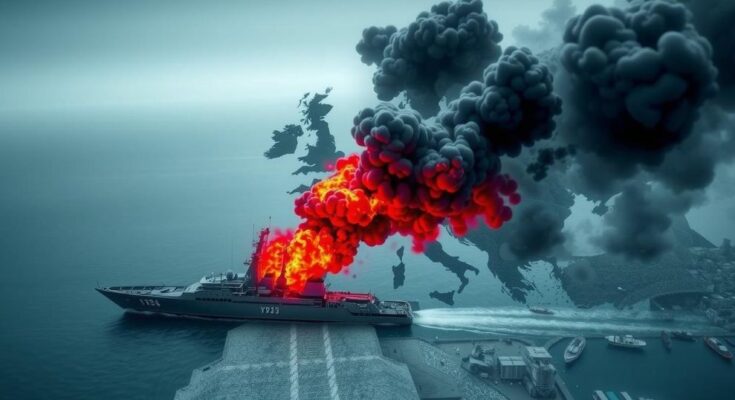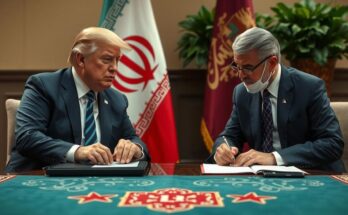Italy’s Defense Minister raised concerns over Russia moving military resources from Syria to Libya, which heightens security risks in the Mediterranean. While there are indications of increased Russian activity, particularly air traffic, the nature of any formal agreements with Libyan generals remains unclear. The situation highlights the complexities of international relations involving Russia, NATO, and Turkey.
Italy is expressing significant concern over Russia’s apparent military repositioning from Syria to Libya, as articulated by Defense Minister Guido Crosetto. He noted that resources are being transferred from Tartus, a Russian naval base, to Libya, which poses a more immediate threat in the Mediterranean region. The situation arises after Russian forces have reportedly started to move personnel and military assets due to political changes in Syria.
Recent satellite imagery indicates that Russian vessels previously stationed at Tartus have departed, igniting speculation regarding their potential arrival in Libya’s Tobruk. Moscow has been engaged in discussions with Libyan military leader Gen. Khalifa Haftar to formalize arrangements for utilizing Tobruk’s port. The strategic loss of the Tartus base could intensify Russia’s motivation to establish a presence in Libya.
Analyst Jalel Harchaoui from the Royal United Services Institute has remarked on the uptick in Russian operations in Libya, citing increased air traffic and cargo flights arriving from Russia and Belarus. He emphasized that this shift indicates a growing Russian influence in the region, particularly given their existing military facilities in eastern Libya that serve logistical purposes.
Concerns about Russia’s intentions are further compounded by the potential repercussions for NATO and the United States, particularly if Russia fully integrates into Libya. Should they fully establish a presence in Tobruk, it would signal a rejection of Western diplomacy and provoke a response from the U.S. and U.K. Ben Fishman from the Washington Institute highlights the ongoing relations between Russia and Haftar, suggesting strategic cooperation may be on the rise.
While there is speculation regarding formal agreements between Russia and Haftar, experts underline the absence of definitive evidence confirming such arrangements. The Libyan National Army (LNA), under Haftar, may engage with Russian support, yet there remain documented instances of resistance towards direct Russian military involvement. The current dialogue within Libya illustrates the complexity of international relations at play, exacerbated by ongoing negotiations with U.S. officials and the presence of Turkey, which supports the rival Tripoli government.
In conclusion, the shifting military dynamics in the Mediterranean raise significant strategic concerns for Italy and its allies. Increased Russian activity in Libya, in tandem with possible military agreements, stresses the importance of diplomatic engagement and monitoring by Western powers. The uncertain geopolitical landscape emphasizes the potential for escalated tensions, warranting careful scrutiny of Russian intentions in the region.
The article focuses on the concerns raised by Italy regarding Russia’s military maneuvers as it reallocates assets from its base in Syria to Libya. This shift comes in the wake of recent developments in Syria, and the implications of Russian naval presence in the Mediterranean region are provoking unease among NATO allies. The presence of Gen. Khalifa Haftar, a prominent military figure in Libya, and his dealings with Russia are also significant factors for consideration amidst existing power dynamics in both Libya and the broader Mediterranean.
In summary, the potential relocation of Russian military assets from Syria to Libya poses a strategic threat to Italy and its allies. The implications of such actions necessitate a closer examination of the evolving relationships and military strategies at play in the Mediterranean, especially regarding Russia’s alliances and the responses from NATO and the United States. The situation remains fluid, with the need for diplomacy and proactive engagement becoming increasingly critical.
Original Source: www.defensenews.com




